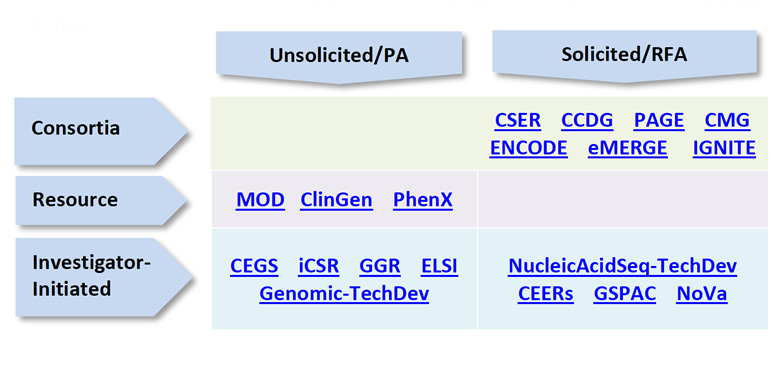Last updated: July 06, 2017
July 6 2017 The Nhgri Extramural Grant Portfolio Using Different Approaches To Fund Genomics Research
The Genomics Landscape
The NHGRI Extramural Grant Portfolio: Using Different Approaches to Fund Genomics Research
July 6, 2017

Last month brought the welcome news that President Trump has officially asked Francis Collins to continue as the NIH Director. NHGRI is certainly very happy about this development!
Meanwhile, the NHGRI-Smithsonian exhibition, Genome: Unlocking Life's Code, has now moved to Houston, Texas as part of its ongoing North American tour. The exhibition is now open at The Health Museum until September 11, 2017. I encourage you to visit the exhibition if you are in the Houston area.
- The NHGRI Grant Portfolio: Using Different Approaches to Fund Genomics Research
- Selection of New Director, National Cancer Institute
- Genetics/Genomics Competency Center (G2C2) Expands with More Resources
- NHGRI Co-Sponsors Educator Workshop: The Immortal Henrietta Lacks
All the best,
Eric
The NHGRI Extramural Grant Portfolio: Using Different Approaches to Fund Genomics Research
The various Institutes and Centers at NIH differ in their use of the available approaches for funding extramural grants. Some mostly fund 'classic' investigator-initiated applications, in which the proposed research is almost entirely formulated and executed by the investigator(s). Others make greater use of approaches for funding more managed research projects that often involve the formation of consortia that conduct research with a more 'team science' style.
Originally established to help lead the Human Genome Project (HGP), the NHGRI Extramural Research Program (ERP) is perhaps best known for funding consortia-based research projects. The Institute followed its support of the HGP with central roles in other large 'team science' efforts (e.g., HapMap, ENCODE, and eMERGE). Because of this history, NHGRI's reputation has become strongly aligned with funding large, organized projects as opposed to investigator-initiated research. Among the NIH Institutes and Centers, NHGRI indeed falls towards one end of the spectrum in terms of the funding of managed research consortia. However, it is important to point out that this is far from an absolute; in fact, NHGRI also funds an extensive amount of investigator-initiated research, as explained below.

NIH typically uses the terms 'solicited' and 'unsolicited' to classify grants. A solicited grant is one that is submitted in response to a Request for Applications (RFA); an RFA is a formal statement that solicits applications in a well-defined area. NHGRI often uses RFAs to fund its large, consortia-based projects. An unsolicited grant is one that is submitted in response to a Program Announcement (PA) - either an NIH-wide announcement or one issued by an NIH institute. PAs are broad funding opportunity announcements that allow applicants to submit investigator-initiated applications; these include PAs with special receipt, referral, and/or review considerations (PARs) as well as PAs with set-aside funds (PAS). However, 'unsolicited' applications are not exclusively 'investigator-initiated,' and 'solicited' applications are not exclusively for 'consortia-based' research. In fact, some NHGRI RFAs have been more general, requesting applications that share features that are quite similar to unsolicited applications. Furthermore, the NHGRI extramural grant portfolio is not just divided into these two types of applications and research projects; rather, NHGRI employs a range of approaches for funding its research. Below are examples illustrating different points along this continuum.
The Centers for Common Disease Genomics (CCDG), which aims to identify rare risk and protective genomic variants contributing to common diseases, and the Centers for Mendelian Genomics (CMG), which aims to discover the genes and genomic variants that underlie human Mendelian disorders, are prototypic RFA-driven, 'team science' research consortia. They have management components that include production goals, quality standards, data release policies, working groups, a coordinating center, external scientific advisory panels, joint publications, and significant interaction with NHGRI staff.
In contrast, the NHGRI Novel Nucleic Acid Sequencing Technology Development RFAs that have been associated with the Genome Technology Development Program supports investigator-initiated research that fits under the general umbrella of developing sequencing technologies. A major goal of these RFAs has been to encourage the submission of high-risk, creative ideas from individual independent investigators (rather than establishing a coordinated consortium).
NHGRI funds a number of resources, often associated with unsolicited applications. These differ from investigator-initiated research project grants in that they support research infrastructure and other resources. These efforts are often funded as cooperative agreements, which means they have substantial involvement by NHGRI staff, although often less formal involvement than for coordinated consortia. One example of this is the set of Model Organisms Databases (MODs), which are supported through a PA as part of the Computational Genomics and Data Science Program. NHGRI encourages interaction among the MODs and the sharing of experiences to increase efficiency and improve operations, most recently through the creation of the Alliance of Genome Resources.
While associated with a PA, NHGRI's Centers for Excellence in Genome Science (CEGS) reflect large grants and are carefully designed to meet programmatic goals. Even so, these groups' efforts are not managed. As stated on NHGRI's website, CEGS "conduct highly innovative research designed to develop new concepts, methods, technologies, or ways to analyze data that will substantially advance the state of the art in genomic approaches to the study of a biological problem." Successful applications involve performing investigator-initiated research.
In recent years, NHGRI has made genomic medicine a priority programmatic area. The Institute has primarily used RFAs to stimulate this area through NHGRI-established consortia, such as the Electronic Medical Records and Genomics (eMERGE) Network (which combines biorepositories with electronic medical record systems for genomic discovery and genomic medicine implementation research) and the Implementing Genomics in Practice (IGNITE) program (which aims to develop methods for incorporating genomic information into clinical care). These genomic medicine research projects involve highly collaborative consortia that are testing multiple approaches for genomic medicine implementation and developing best practices for the field, with the science largely shaped by the grantees. In the latest phase of the Clinical Sequencing Exploratory Research (CSER) program, NHGRI issued a PA specifically seeking investigator-initiated research applications to accompany the RFA-funded components of the program. Other investigator-initiated applications in genomic medicine are strongly encouraged to come in under the 'parent' R01 program announcement (pending the development of more specific genomic medicine program announcements).
The table below illustrates where the some NHGRI extramural research programs fit along the solicited versus unsolicited and the investigator-initiated versus consortia continuum.

In summary, NHGRI uses both RFAs and PAs to guide extramural applicants relative to the Institute's programmatic interests. Also, by using managed consortia, NHGRI is able to bring together investigators to tackle large research problems that otherwise might not be well-addressed in an integrated way. NHGRI will continue to use a blend of these different approaches to support genomics research, continually fine-tuning the relative use of each based on the changing scientific opportunities.
More from The Genomics Landscape:
Selection of New Director, National Cancer Institute
President Trump has selected a new Director of the National Cancer Institute (NCI). Norman "Ned" Sharpless, M.D. will join NCI from the University of North Carolina, where he currently serves as Director of the Lineberger (NCI-designated) Comprehensive Cancer Center and as the Wellcome Distinguished Professor in Cancer Research. A practicing oncologist caring for patients with leukemia, Dr. Sharpless also leads a research group studying the cell cycle and its role in cancer and aging.
Genetics/Genomics Competency Center (G2C2) Expands with More Resources
To support the introduction of genomics into clinical care, NHGRI has worked with experts from several health professional disciplines to create and maintain the Genetics/Genomics Competency Center (G2C2). G2C2 is a free, online catalog of educational resources for health professionals to identify educational materials to increase their knowledge and skills pertaining to genomic medicine. G2C2 was updated recently, providing new resources for a variety of disciplines within healthcare teams. In addition, G2C2 now includes landing pages for professional societies as part of its increased collaboration with the Inter-Society Coordinating Committee for Practitioner Education in Genomics (ISCC), an organization to facilitate communication about genomic medicine among clinical professional societies. For more information, visit G2C2 at genomicseducation.net/.
NHGRI Co-Sponsors Educator Workshop: The Immortal Henrietta Lacks
On June 29, NHGRI partnered with the Smithsonian's National Museum of African American History & Culture to co-sponsor a workshop for middle and high school science and history educators. The workshop covered the life of Henrietta Lacks, the woman from whom the immortal HeLa cell line was generated. Sessions from the workshop included the science behind HeLa cells, the significance and ethical issues related to Ms. Lacks' contribution, and a session on African Americans in the medical field from the pre-1950s. The workshop also hosted hands-on science demonstrations. More information about the event can be found here.
Spotlight on the All of Us Research Program
- Beta testing, the testing of the first iteration of the research protocol and technology systems by the first participants, began for NIH's All of Us Research Program.
- Chris Lunt named Chief Technology Officer of the All of Us Research Program.
- Connect with All of Us via email updates on joinallofus.org/, and follow the initiative on Facebook and Twitter @AllofUsResearch.
NIH & NHGRI News
Unlocking Life's Code: June 2017 Newsletter
Testimony on the Fiscal Year 2018 Budget Request before the Senate Committee
Funding Notices
Change in Application Due Date and Eligibility Requirements for Emerging Global Leader Award
NIH Extramural Loan Repayment Programs - Clinical Researchers, Pediatric Research, Contraception and Infertility Research, & Health Disparities Research
Extramural Clinical Research Loan Repayment Program for Individuals from Disadvantaged Backgrounds
Genomics Research
NIAID Scientists Discover Rare Genetic Susceptibility to Common Cold
Scientists Identify Single-Gene Mutations that Lead to Atopic Dermatitis
Precision Oncology: Gene Changes Predict Immunotherapy Response
Researchers Uncover Genetic Gains and Losses in Tourette Syndrome
Notable Accomplishments in Genomic Medicine
Mouse Genes Could Help Decipher Human Disease
Huntington's Disease: Gene Editing Shows Promise in Mouse Studies
NIAID Scientists Identify Cause, Possible Treatment for Life-Threatening Gut Condition
Sequencing Healthy Patients Reveals That Many Carry Rare Genetic Disease Risks
Funding Opportunities
Centers of Excellence in Ethical, Legal and Social Implications (ELSI) Research (CEER)
NIH, CDC, and FDA for Small Business Innovation Research Grant Applications (Parent SBIR)
NIH for Small Business Technology Transfer Grant Applications (Parent STTR)
New Videos
Genomics: Will It Help Us Address Health Disparities? - Mark Cullen
Past editions of The Genomics Landscape
To receive email updates, sign up for The Genomics Landscape Listserv.
To suggest future topics, please send an e-mail to NHGRILANDSCAPE@MAIL.NIH.GOV
Posted: July 6, 2017
